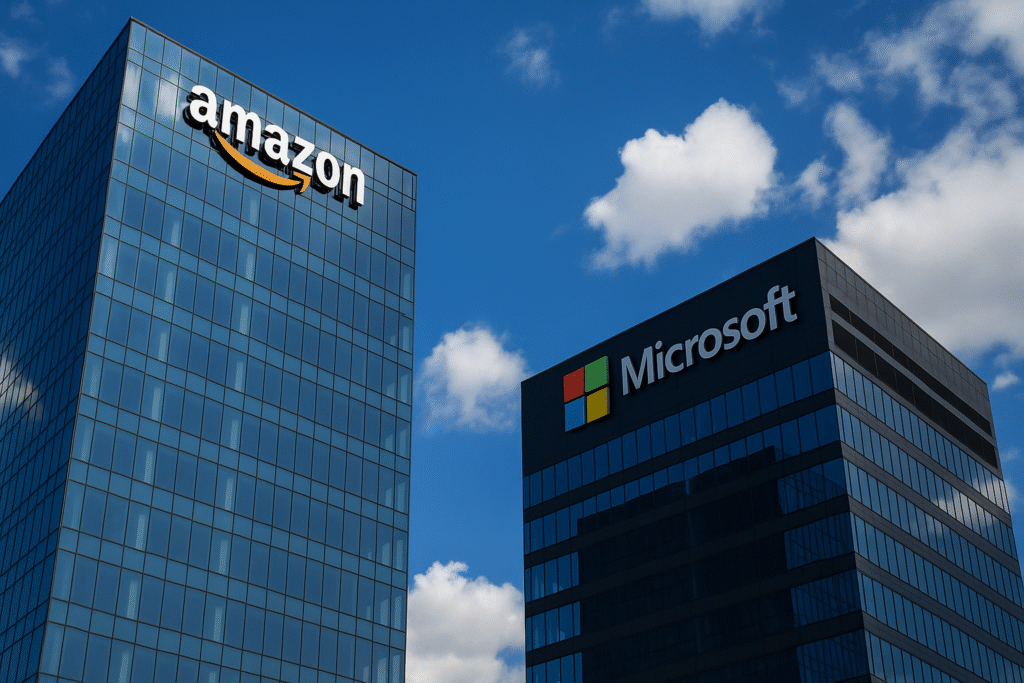The UK’s Competition and Markets Authority (CMA) has released a powerful report, warning that a dangerous cloud monopoly is forming in the country, largely controlled by tech giants Amazon and Microsoft. These two companies reportedly hold 70 to 80% of the public cloud infrastructure market in the UK a staggering figure that suggests significant risk to competition, innovation, and consumer choice.
Cloud computing has become the backbone of modern businesses, governments, and startups. But according to the CMA, the market is tilting heavily toward what many experts now call a cloud monopoly, dominated by Amazon Web Services (AWS) and Microsoft Azure. This dominance raises concerns about unfair pricing, customer lock in, and stifled innovation.
Inside the CMA’s Findings: A Market Gone Wrong
1. High Egress Fees Create Lock In
The CMA found that data egress fees charges applied when transferring data out of a cloud provider are a major barrier to competition. Amazon, in particular, imposes high egress fees that deter customers from migrating to alternative providers. It’s like being charged to leave your apartment, says
Dr. Laura Mackenzie, a cloud policy researcher. These fees keep customers inside a system even if better alternatives exist. This pricing strategy strengthens the cloud monopoly by making it financially difficult to move to smaller or more innovative cloud services.
2. Microsoft’s Licensing Model Raises Eyebrows
Microsoft’s licensing practices were also criticized. Their policy gives financial benefits to clients using Azure, compared to other platforms. This creates an unfair advantage that discourages businesses from exploring other options.
In a real life case study, a UK-based analytics firm called DataNest attempted to shift from Microsoft Azure to Google Cloud but faced a 20% cost increase due to lost license discounts. We weren’t switching just for fun we needed better analytics tools, said Tom Linford, CTO at DataNest. But the pricing made it impossible.
The firm remained stuck within Microsoft’s ecosystem another win for the cloud monopoly, and another loss for open competition. Tech industry analysts are increasingly concerned. Rebecca Houghton, a senior cloud strategist, said, This isn’t healthy market competition. This is market capture.
She added that such dominance stifles new ideas, limits diversity in service offerings, and forces companies into long term commitments that hurt flexibility.
A group of UK cloud providers including Civo, Linode, and IONOS jointly backed the CMA report, stating that the cloud monopoly created by Amazon and Microsoft makes it nearly impossible for smaller providers to survive.
A Consultant’s First Hand Experience
Simon Hale, a freelance IT consultant, recently helped a healthcare company in London try to switch from AWS to a hybrid model. He shared, The egress fees alone were thousands. Then we hit compatibility issues, delays, and contract fine print we hadn’t expected.
They eventually abandoned the migration project. This reflects a typical scenario under the current cloud monopoly, where large firms retain customers not through better services, but by making exit practically impossible.
CMA Recommends Conduct Requirements
To address this growing problem, the CMA suggests conduct requirements, such as, Regulating egress fees, Ensuring fair software licensing, Banning anti competitive discounts, Promoting interoperability. Without immediate action, the cloud market risks becoming a two player game, warned Marcus Booker, the CMA’s digital markets lead.
And that’s not a game customers can win. The CMA is expected to work closely with the UK’s Digital Markets Unit (DMU) to implement new oversight measures aimed at dismantling this harmful cloud monopoly.
A Global Concern
Although this report focuses on the UK, its implications ripple beyond borders. In Europe, the European Data Protection Board (EDPB) has also raised flags about cloud concentration, especially in terms of data privacy and compliance. In the US, lawmakers are considering antitrust legislation that may also apply to cloud platforms.
This is a global challenge, says journalist Tanya Mishra, who covers tech regulation. We need a globally coordinated response to tech monopolies, and the cloud is ground zero.
Breaking the Cloud Monopoly
The CMA’s investigation shines a bright light on the silent threat of a cloud monopoly. When just two companies control most of the infrastructure used by businesses, governments, and startups, the risks are enormous: limited choice, high costs, slowed innovation, and unfair business practices.
For the cloud to remain a driver of growth and not a bottleneck, transparency, fairness, and open competition must be protected. The CMA’s report could be the first real step toward a freer, fairer future in cloud computing.

